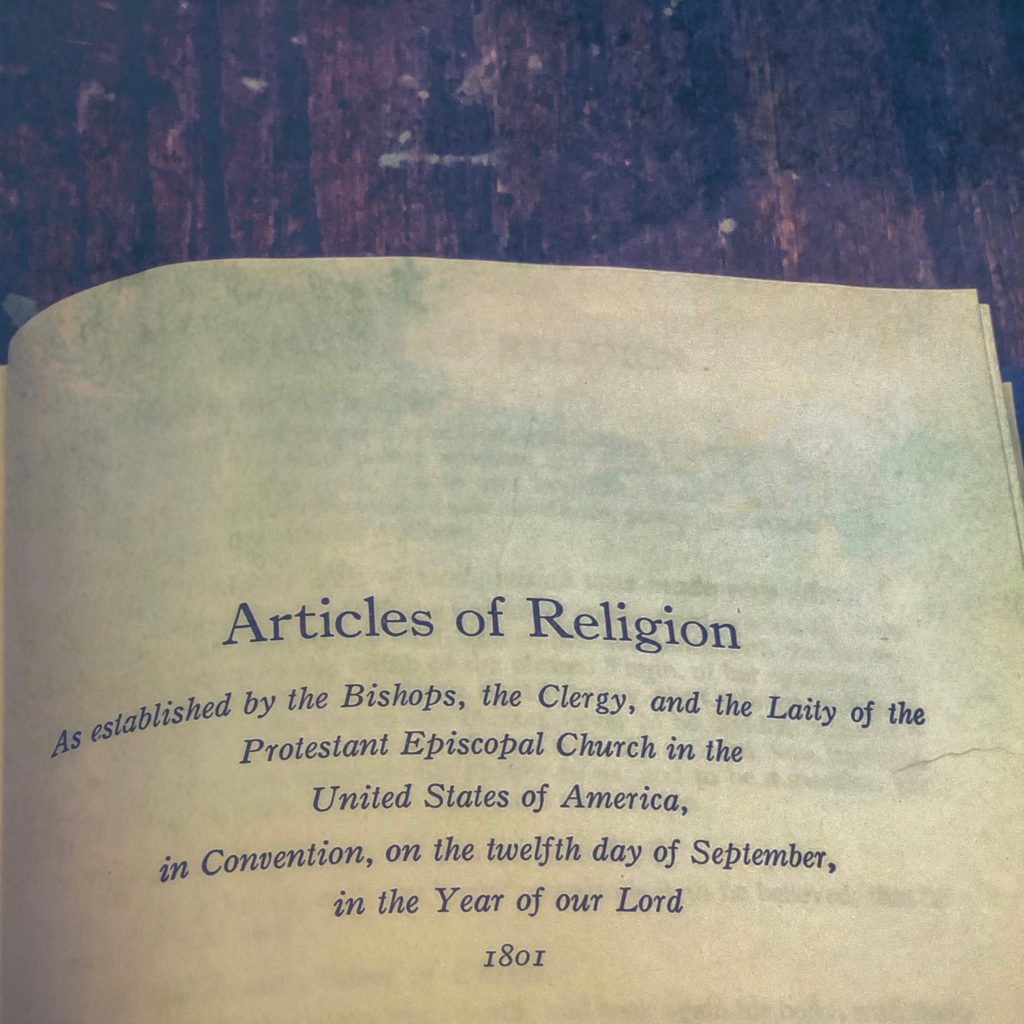
XXIX. Of the Wicked Which Eat not the Body of Christ in the Use of the Lord’s Supper
The Wicked, and such as be void of a lively faith, although they do carnally and visibly press with their teeth (as Saint Augustine saith) the Sacrament of the Body and Blood of Christ, yet in no wise are they partakers of Christ: but rather, to their condemnation, do eat and drink the sign or Sacrament of so great a thing.
by Richard Pryor, III
Article XXIX came into being in the 1571 edition of the Articles of Religion, the last to be published in the reign of Queen Elizabeth I.[1] Historically, this Article can be traced all the way back to the Apostle Paul and his manducatio impiorum (eating by the impious), who wrote in his first letter to the Corinthians that “Whoever, therefore, eats the bread or drinks the cup of the Lord in an unworthy manner will be answerable for the body and blood of the Lord. Examine yourselves, and only then eat of the bread and drink of the cup. For all who eat and drink without discerning the body, eat and drink judgment against themselves.”[2]
Ultimately, this idea became more common in the Formula of Concord in the The Book of Concord, a Lutheran document published thirty years after Luther’s death – “Whether in the Holy Supper the true body and blood of our Lord Jesus Christ are truly and essentially present, are distributed with the bread and wine, and received with the mouth by all those who use this Sacrament, whether they be worthy or unworthy, godly or ungodly, believing or unbelieving; by the believing for consolation and life, by the unbelieving for judgment? The Sacramentarians say, No; we say, Yes.”[3]
Paul’s words to the Corinthians also offer a second doctrine – the manducatio indignorum (eating by the unworthy). While the manducatio impiorum might have gotten most of the attention in this modern era (at least according to my Internet searches), it is clear that the Apostle is much more concerned about the unworthy. “Examine yourselves, and only then eat of the bread and drink of the cup,” he instructs. “For all who eat and drink without discerning the body, eat and drink judgment against themselves. For this reason many of you are weak and ill, and some have died. But if we judged ourselves, we would not be judged.”[4]
Christ’s presence in the Eucharist is a mini Judgement Day for us over and over, day by day, week by week, and so on and so forth. In the Catechism of the 1979 edition of The Book of Common Prayer of The Episcopal Church (TEC), the following two dialogues are next to each other in the section entitled “The Holy Eucharist.”
Q. What are the benefits which we receive in the Lord’s Supper?
A. The benefits we receive are the forgiveness of our sins, the strengthening of our union with Christ and with one another, and the foretaste of the heavenly banquet which is our nourishment in eternal life.
Q. What is required of us when we come to the Eucharist?
A. It is required that we should examine our lives, repent of our sins, and be in love and charity with all people.[5]
“This is my Blood of the new Covenant, which is shed for you and for many for the forgiveness of sins. Whenever you drink it, do this for the remembrance of me.”[6] Our new Covenant, instituted in the Eucharist and sealed in Christ’s body and blood, promises us the Kingdom of God, which we shall inherit, being made worthy through the forgiveness of God through Jesus Christ.
Being forgiven, whether granted by ourselves, those we are in relationship with, or by God, requires the self-examination that Paul and the Catechism both speak about. In his second letter to the Corinthians, Paul’s call echoes throughout the realms of time and space – “Examine yourselves to see whether you are living in the faith. Test yourselves. Do you not realize that Jesus Christ is in you?—unless, indeed, you fail to pass the test!”[7] And as the author of 1 John notes, “If we say that we have no sin, we deceive ourselves, and the truth is not in us.”[8] Only by knowing ourselves and studying our lives can we effectively confess our sins and purify ourselves.
In our context, a faithful understanding of the manducatio indignorum and the manducatio impiorum offer us, no matter our positions on the importance of the Articles in our lives and practice, guidelines for our relationship with Christ in the Eucharist.
The Confession of Sin is mandated at most Eucharists in the Episcopal Church (TEC) (and not to get on a tangent, but this is one of the reasons I oppose getting rid of it for the Easter season); for this very reason, and at one extreme, priests are given the option to bar people who are living “notoriously evil lives”[9] from receiving the Eucharist until there is “clear proof of repentance and amendment of life.”[10]
Similarly, the Constitution and Canons of TEC are quite clear that none shall be admitted to Communion who have not previously been baptized. As the Theology Committee of the House of Bishops of TEC wrote in 2009, “Baptism unites one to Christ. One receives thereby Christ’s own Spirit as the power to lead a reformed, Christ-like life. In the eucharist one actually draws upon that life-giving Spirit, which comes to us through the gift of Christ’s own humanity to us in the elements, to grow into and sustain under trial a Christ-like transformation of life.”[11]
From reading those last two paragraphs, we might be inclined to take Article XXIX, the manducatio indignorum, and the manducatio impiorum for granted in TEC and the Anglican Communion. However, we are always called to more in our relationship with Christ, and in remembering the guiding principles that Paul set out.
As the “Prince of Preachers,” Charles Spurgeon wrote: “we know Christ and are known of him, and this is our life’s work to go on to know him yet more and more, and to know the Father in him.”[12] We know Christ through encountering Him, and if our life’s work is to know him yet more and more, we must keep encountering him. We make it harder to encounter Christ when we sin – one word in Ancient Greek for sin, ἁμάρτημα, is derived from ἁμαρτάνω, meaning to miss the mark, or to fail at, amongst other meanings.[13] And ultimately, the manducatio indignorum joins into the manducatio impiorum, as we fail to know, recognize, and believe in Christ if we continue to miss the mark without correction.
In his epistle, James tells us that “every generous act of giving, with every perfect gift, is from above, coming down from the Father of lights.”[14] Everything on this Earth has been created by God for us and the use of all living creatures. Knowing God more is learning to see God at work in all of creation and then responding to that knowledge. Our daily or weekly communing with Christ in the Eucharist is a tangible reminder of the encompassing work of God. It might just be a wafer and wine, but through those ordinary objects, we are given that tangible reminder – if only we recognize it for what it is.
Richard Pryor, III, a member of
Christ Church, Kent, is an active layman in the Episcopal Diocese of Ohio and
at the University of the South, where he is a rising senior majoring in
history.
[1] Charles Hardwick, A History of the Articles of Religion (1856), 351, http://books.google.com/books?id=rcICAAAAQAAJ&oe=UTF-8.
[2]1 Cor. 11:27-29, NRSV.
[3] “The Epitome of the Formula of Concord,” The Book of Concord (1577), http://bookofconcord.org/fc-ep.php.
[4] 1 Cor. 11:29-31, NRSV.
[5] The Episcopal Church, The Book of Common Prayer (1979), 859-860, https://www.bcponline.org.
[6] Ibid., 363.
[7] 2 Cor. 13:5, NRSV.
[8] 1 John 1:8, NRSV.
[9] The Episcopal Church, BCP, 409.
[10] Ibid.
[11] Theology Committee of the House of Bishops, “Reflections on Holy Baptism and the Holy Eucharist: A Response to Resolution D084 of the 75th General Convention,” Anglican Theological Review (May 2009), 3.
[12] Charles Spurgeon, “Why May I Rejoice?,” Metropolitan Tabernacle Pulpit Volume (22, October 1876), https://www.spurgeon.org/resource-library/sermons/why-may-i-rejoice.
[13] Wiktionary, https://en.wiktionary.org/wiki/ἁμαρτάνω#Ancient_Greek.
[14] James 1:17, NRSV.
